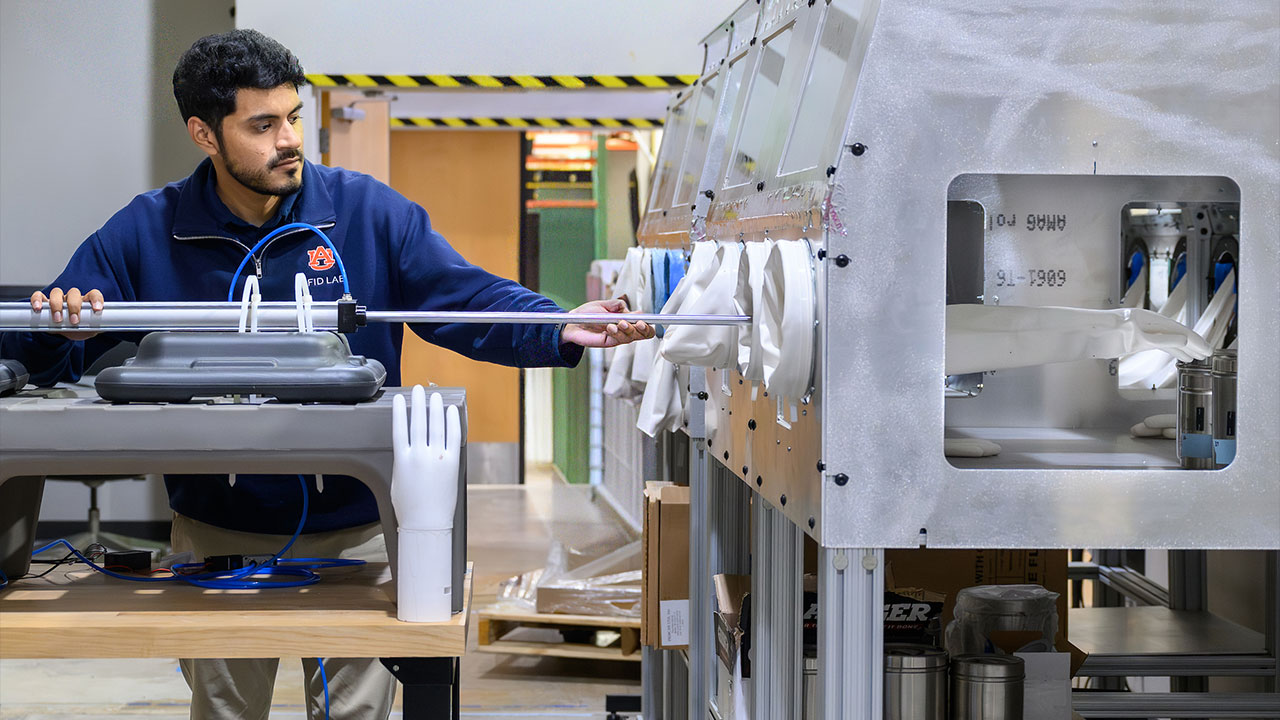content body
The RFID Lab at Auburn University has been a hub for innovative research and collaboration since relocating from the University of Arkansas over a decade ago.
RFID — Radio Frequency Identification — was developed by Allied forces during World War II to distinguish between friendly and enemy aircraft.
These days, RFID is everywhere: from grocery stores and pet chips to E-Z passes and amusement park wristbands.
Unlike barcodes, RFID tags don’t need to be visible to scan, making inventory management faster and more efficient. Farmers use RFID ear tags for livestock, airlines track baggage and equipment and hospitals manage medication supplies.
Auburn RFID is a leader, applying the business case and technical implementation of RFID and other emerging technologies in retail, aviation, defense, supply chain and manufacturing.
Faculty and students in engineering, business, apparel, agriculture and other disciplines conduct research at the lab. In the sprawling space of a former grocery store, Auburn RFID features separate areas dedicated to different purposes, such as a mock retail store for testing inventory tracking processes and a sensory-free room for testing tags in a controlled environment.
Bu with recent growth in partnerships and research, the lab has outgrown this home. A new, larger facility will break ground next year in the Auburn University Research Park.
Partnerships
Auburn RFID continues to partner with major companies like Delta Air Lines, UPS, McDonald’s and Walmart.
At the lab’s annual conference in April, Walmart U.S. President and CEO John Furner praised Auburn RFID for its problem-solving work across multiple industries: “If it weren’t for the lab, … we’d still be struggling with some of the early problems we had 20 years ago.”
Executive Director Justin Patton, who has been with the lab since its inception at Arkansas, has led research and testing to help companies achieve better outcomes.
“We are proud to continue serving as a research lab for innovation and providing real-world solutions,” he said.
Another partnership involves using RFID to support national security efforts at the Los Alamos National Laboratory (LANL), the U.S. Department of Energy facility in New Mexico. Auburn is collaborating with TechSource Inc. and LANL on its Weapons Production-Technology and Nuclear Training (WP-TNT) initiative to advance research, education and workforce development.
The current focus is on testing and refining RFID technologies to optimize inventory management of critical materials in LANL’s secure and high-demand environments, where precision and accountability are essential.
“This work combines our expertise in sensor technology with their experience in national security research, which allows both of us to explore new approaches to efficiency and data accuracy,” Patton said.
The Auburn team replicated a LANL storage facility and developed a robotic arm to evaluate the durability of an RFID tag against repeated handling and environmental wear. The results will show how reliable the tech can be in such a complex operational setting.
Beyond research
The Auburn-LANL collaboration continues to support workforce development and educational engagement as Auburn students deepen their understanding of RFID technology and its applications by working with Los Alamos subject matter experts.
“The opportunity to work with a premier government technology lab empowers our students to have hands-on experience with RFID applications and expand their knowledge of implementation in adverse environments,” Patton said.
Supporting WP-TNT reflects Auburn’s growing role in national research and commitment to developing technologies that enhance operational efficiency and reliability.
“By combining academic research with practical implementation, this partnership continues to advance RFID technology while preparing students to lead in data-driven inventory management and secure operations,” Patton added.







